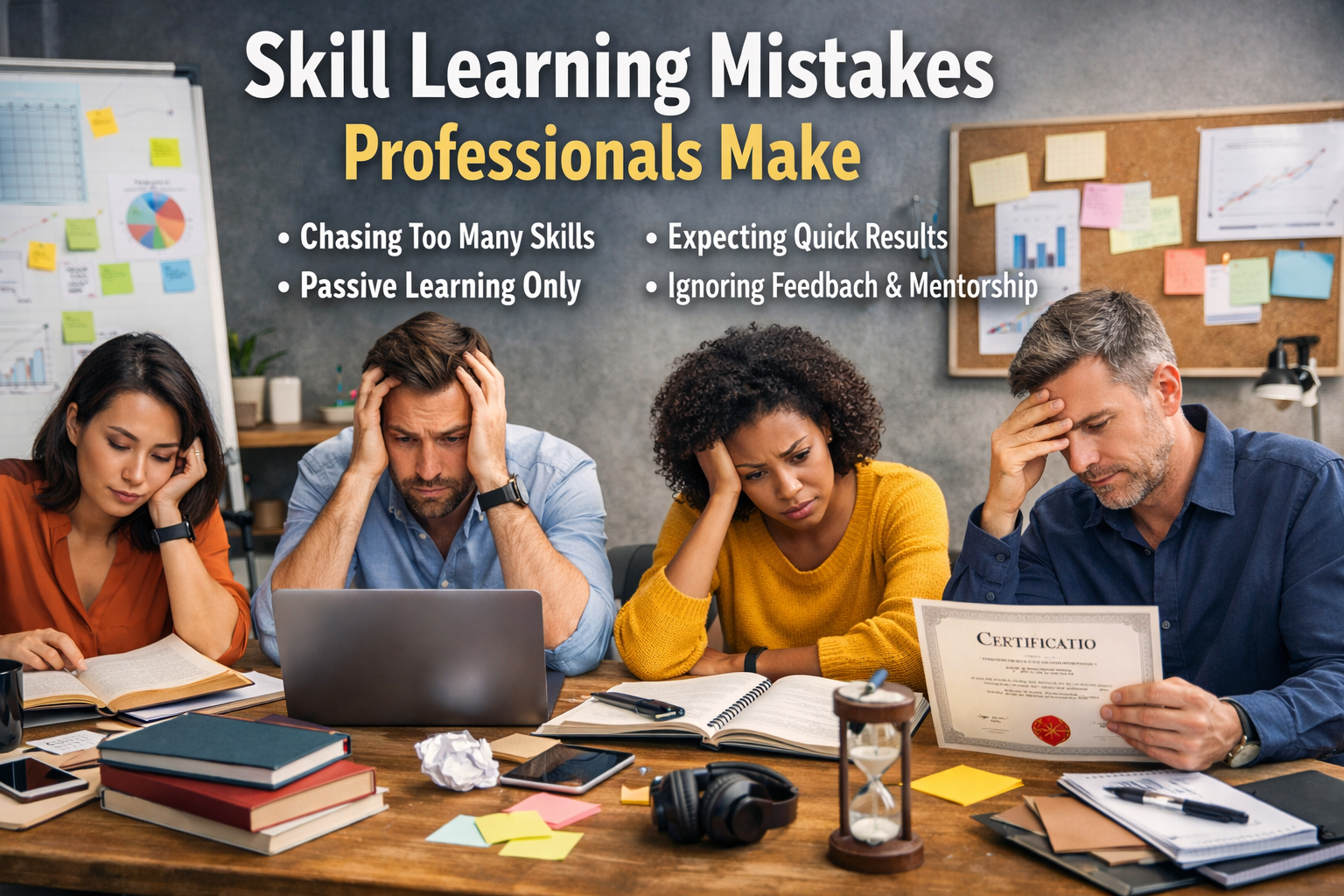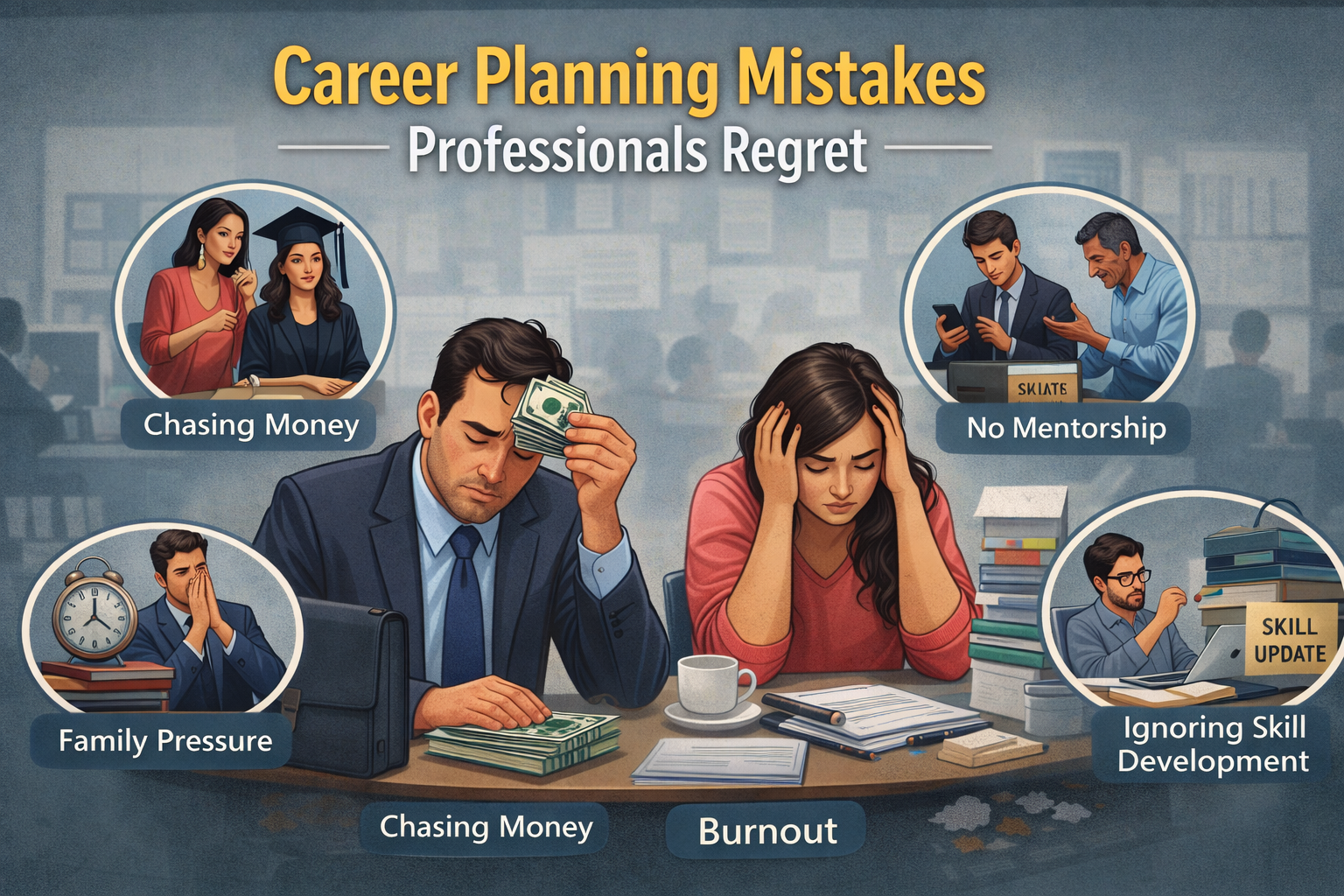Introduction
Remote job has now become everyone’s preference because nobody wants to waste their time and money travelling to the office. People feel that if they can balance both work and family well through remote jobs, then why not choose remote work?
Now, you’ve made up your mind, but are you confused about how to get started?
Don’t worry!
This article is written just for you. In this guide, you’ll find everything you need to know that will help you land a remote job.
It provides a step-by-step guide to applying for remote jobs.
If you truly want to get a remote job, then go through this informative article till the end.
You can read summary of the article here.
Step-by-Step Guide for Remote Job
1. Identify Your Career Goal
First, you need to be clear about your career goals before applying to any remote job. It is very important to decide in which industry you want to grow and which field is remote-friendly.
Choosing the right remote-friendly industry
In today’s time, many industries support remote work like content writing, graphic design, customer support, digital marketing, data entry, tech, and freelancing. Choose an industry according to your interest and long-term career growth.
Matching your skills to remote opportunities
There is a demand for specific schemes for every industry. Like if you are interested in content writing then you should have writing, .SEO, and research skills. If you are interested in the tech field then you should know coding, problem-solving, and knowledge of the latest tools. Analyse your skills and match them with remote opportunities.
2. Prepare Your Resume and Portfolio
Only applying to remote job is not enough your resume and your portfolio should also be perfect which can grab the attention of the hiring manager. Because in remote hiring recruiters cannot meet you face to face that’s why your resume and online presence are your identity.
How to tailor a resume for a remote job?
- Avoid sending a general resume for every job, instead customise your resume according to the job description.
- Include keywords from the job description smartly in your resume.
- Write your achievements in a measurable form like managing a team of 5 members across three time zones and completing a project 20% before the deadline.
- Highlight if you have experience with remote work. And if you haven’t worked directly for a remote work, then you can mention freelancing projects, internships, or online collaborations.
Creating an online portfolio or LinkedIn profile
In today’s digital era recruiters first check your LinkedIn profile and online presence which is why, complete your LinkedIn profile, share projects, blog, or achievements on LinkedIn
Highlighting remote skills
In remote jobs, candidates have to show recruiters that they are self-disciplined and can work without supervision which is why they should show skills in their resumes like time management, communication skills, tech savviness, and adaptability.
3. Find a Remote Job Platform
When your resume and portfolio are ready the next step is searching for remote jobs on the right platform. Thousands of job portals are available on the internet, but not all are reliable. That’s why focusing on trusted platforms and direct company websites is important.
Popular remote job board
Best Job Tool is the best job search platform to find relevant jobs according to your skills and interests. It is a dynamic job search platform dedicated to connecting talented individuals with leading employers across various industries.
A trusted platform that offers hand-screened remote, part-time, and freelance jobs across various industries. It’s ideal for professionals looking for flexible work options.
One of the largest job boards dedicated to remote jobs. It features roles in design, programming, marketing, and more.
Indeed is a job search engine that collects job listings from thousands of websites, company career pages, and job boards. Here, you can upload your resume and search for jobs using filters like location, salary, and experience.
It is a professional networking platform where people create their professional profiles to showcase their skills, experience, and achievements. This is the best platform for finding professional jobs.
- Create a complete and updated profile on every platform so that recruiters can see your skills and experience quickly.
Following companies’ career pages directly
Do not depend only on the job board. If you like any specific company then check their career page regularly. For example, tech companies like Google, Microsoft, Zapier, Toptal, and content agencies that post remote openings directly on their website. You don’t need to wait for the job board and competition will also be less. You can set a job alert to follow career pages through which you get an email of new openings directly.
If you follow remote job boards and companies’ career pages in a consistent way then you will get genuine and suitable opportunities easily.
4. Write a Tailored Application for Remote Job
Now that you have cleared your career goal, prepared a resume and portfolio, and have started exploring the job platforms then your next step is writing a strong and customised application.
Competition is high in remote jobs which is why sending a general copy-paste application decreases your chances. Writing a tailored application for every job is important, it shows recruiters directly that you are the best fit for the requirement.
Crafting a remote-focused cover letter
A cover letter shows your personality and motivation. Include all these things in your cover letter,
- Give a reference to the job posting and tell them that you are interested in this role.
- Mention your relevant skills and past experiment that match with job description.
- Highlight remote-friendly skills like self-discipline, collaboration, independent work.
- In the end, don’t forget to write a professional and confident closing like “I am excited about the opportunity to contribute to your remote team, and look forward to this setting which showcases my skills and I can add value”.
Using keywords from the job description
The recruiter and Applicant Tracking System (ATS) both check keywords. If the job description includes terms like SEO writing, WordPress, and deadline management then include these terms naturally in your resume and cover letter. Through this your application will pass through the filter and recruiter feel that you fulfils exact requirements.
Showing examples of independent or remote works
In a remote job, recruiters want to see whether you can work without supervision or not. If earlier you have done any freelance project, internship, or team collaboration then mention their examples. For example, “successfully handled a free freelance writing project for an international client coordinating entirely through online tools like Slack and Trello”.
- A tailored application convinces the recruiter that you are not a random applicant that you are genuinely interested in their company.
5. Prepare for a Remote Job Interview
After shortlisting your resume the most important step is the interview. Interviews are mostly online in remote jobs through Zoom or Google Meet. At this stage, you need to show your communication skills, professionalism, and remote readiness to the recruiter.
Common interview format
An interview can be in a different format for a remote job like,
- Face-to-face discussion on video calls through Zoom or Google Meet.
- There are pre-recorded questions and you have to record answers and then send them to the recruiter. This is called asynchronous video interviews.
- Some companies take interviews through written chat.
You need to be prepared for every format.
Mastering virtual communication etiquette
Small things in a remote interview matter a lot.
- Professional background – the background should be clean and distraction-free.
- Good lighting and camera angle – face should be visible clearly use natural light or desk lamp.
- Clear audio – to avoid background noise use headphones or a mic.
- Body language- make eye contact with the camera, keep a smile, and show natural gestures.
Tools you must know
You should have knowledge of some basic tools for remote interviews
- Zoom/ Google Meet/ Microsoft Teams – to join the meeting and share screen.
- Google doc/ Notion/ Trello – if practical tasks are given in the interview then handle them immediately.
- Speed test – check your internet connection before the interview.
Preparing for common remote interview questions
Mainly recruiters ask all all these questions which are listed below,
- How do you stay organised in a remote work environment?
- Which tool do you use for team collaboration?
- How do you manage time zones?
- Share a situation where you completed a project successfully without supervision?
Practice their answers before the interview and reply to them with your real-life example.
6. Showcase Remote Job Readiness
Only technical skills are not enough for a remote job, recruiters also want to see if you are ready for a remote environment or not. Can you work independently, handle tools, and collaborate effectively with the team? In this step, you need to highlight your remote-friendly qualities whether it is a resume, interview, or a cover letter.
Highlight essential remote skills
Some core skills are important to become a remote-ready candidate.
- Self-discipline
- Time management
- Communication
- Problem solving
- Adaptability
It means you should have the skills to meet deadlines without supervision, can speak clearly with clients, solve any situation independently, and adjust to new tools technology and time zones.
Mention remote collaboration tools
Having knowledge of tools for remote jobs is a must. Mention in your resume and interview that you are comfortable with these tools such as Slack, Microsoft, Teams, Google Meet, Asana, Notion, Google Drive, Dropbox, and Clockify.
Through this, recruiter feel that you don’t have to waste time for on-boarding because you are already familiar with these tools.
Showcase your remote setup
Sometimes recruiters ask in the interview, “Do you have a proper remote work setup?”
At that time you have to mention your laptop, stable connection, mic, and headphones. If you have a dedicated quiet workspace then highlight that as well. It built trusts with recruiters that you can work without distraction.
Share a remote work example
If you have done any remote or freelance projects then share them. For example, “during my freelance content writing projects, I managed clients from different time zones and successfully delivered 20 + articles using task tracking”.
- Showing remote readiness is important because it gives assurance to potential employers that you are self-motivated, tech-savvy, and reliable. If you highlight these qualities the chances of your hiring will increase.
Conclusion
Landing a remote job might feel tough at first, but it’s completely possible if you know the right steps. In this article, we’ve covered everything from figuring out your career goals, preparing a strong resume and portfolio, finding reliable job platforms, writing tailored applications, to acing remote interviews and showing your remote-ready skills.
Follow these steps carefully, and you’ll be ready to grab the perfect remote opportunity. Dive in, take action, and start your journey toward a flexible and rewarding remote career today!







Leave a Reply